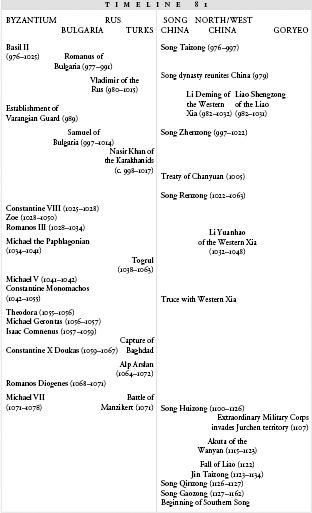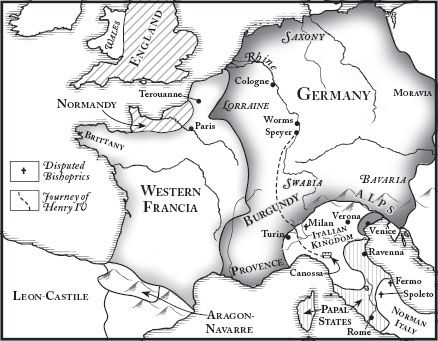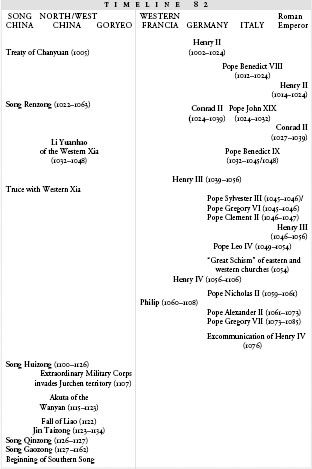The History of the Medieval World: From the Conversion of Constantine to the First Crusade (84 page)
Authors: Susan Wise Bauer

81.1: The Southern Song
I see their forts amid the forest when I gaze toward the Yellow River,
The cloud of dust darkens the sky and the frost wind is bitter,
The silence of the border region rends my heart,
wrote the poet Zhang Xiaoxiang.
The beacon fires have been extinguished,
the soldiers given rest…
Yet I have heard that the old who were left behind in the central plains
Constantly look toward the south
Hoping to see the decorated imperial chariots.
15
But the chariots never came. The Southern Song still claimed the Mandate of Heaven, but it had lost its physical connection to the place where the Mandate first descended. The history of the ancient emperors lay in the valley of the Yellow river; now that valley was in enemy hands.

Between 1060 and 1076, Henry IV refuses to obey the pope, gets himself excommunicated, and is forced to stand barefoot in the snow pleading for mercy
I
N
1060,
THE
C
APETIAN KING
of Western Francia died and left his crown to his seven-year-old son Philip, a child incapable of halting the tide of private warfare that still surged back and forth across the Frankish lands. “Woe to thee, O land, when thy king is a child,” contemporary chroniclers wrote, using the words of the book of Ecclesiastes to lament the disorder in the old Frankish lands.
1
In Germany, another underage king ruled: Henry IV, now ten years old. His mother, who would rather have been a nun than the queen and regent for her son, avoided trouble with the noblemen of Germany by granting them power, and they ruled over their little independent duchies with the prickly defensiveness of minor kings. Right after Easter of 1062, the German archbishop Anno II, with the support of two powerful German counts, invited the young king to come and inspect a ship that had been outfitted particularly for his use. As soon as Henry stepped on board, the oarsmen cast off and whisked him away down the Rhine. The king had been kidnapped.
Twelve-year-old Henry dove into the river in an attempt to escape, but the water was cold and swift, and he nearly drowned before one of the conspirators dragged him back out. They took him to the city of Cologne, imprisoned him (safely and in luxury) in Anno’s palatial archbishop’s residence, and took over the rule of Germany.
2
For three years, until Henry IV turned fifteen and could promise royal aid and support to anyone who might help him get his independence back, the archbishop and his henchmen struggled with each other for control of the country and of the king. Henry watched, waiting for his majority, becoming stronger, more mature, and more ruthless as the months ticked by.
No overarching rule of law could settle the wars between the Christian and Muslim armies farther east, but here, there was one institution that could appeal to all of the battling ambitious parties laying waste to the countryside. Despite the political meddling of a few of its more ambitious officials, the Christian church still preached its message of Christian brotherhood and loyalty to a kingdom not of the earth; the Christian church still claimed the allegiance of all kings and soldiers in the west.
In 1063, priests in the northern German city of Terouanne put together another set of regulations for the Peace and Truce of God. “These are the conditions which you must observe during the time of the peace which is commonly called the truce of God,” the document began, “which begins with sunset on Wednesday and lasts until sunrise on Monday. During those four days and five nights no man or woman shall assault, wound, or slay another, or attack, seize, or destroy a castle, burg, or villa, by craft or by violence.”
3
Furthermore, the Peace would be observed during every day of Advent and Lent, as well as between the church feasts of Ascension and Pentecost—a schedule that made nearly three-quarters of the year off-limits for fighting. This was a lovely idea, but impractical, not to mention almost impossible to enforce. Still, the Peace of Terouanne brought into clearer view a growing tension in the kingdoms of the west: between the ideals of the kingdom of God and the kingdom of men, between the power of priests to enforce Christian behavior and the power of kings and warriors to do as they pleased.
It was a tension that became fully visible when Henry IV tired of his wife.
He had been betrothed, at the age of five, to the four-year-old Bertha of Turin, daughter of a prominent Italian nobleman. The marriage was celebrated when Henry IV turned fifteen, against Henry’s own objections; he had never liked his intended wife, who seems to have been attractive enough but too shy and demure to appeal to the forceful adolescent Henry had become. Still, when Henry’s advisors warned him that he might cause irreparable offense and damage to his prospects in Italy by cancelling the wedding, the king decided to go ahead.
4
By 1069, he had concluded that his marriage was a mistake. He announced that he intended to seek a divorce from Bertha because he was simply unable to consummate the marriage. In an act of slightly overdue gallantry, he added that she was in no way at fault—which didn’t ease her humiliation, but at least protected her from accusations of adultery.
The churchmen of Germany, putting their heads together, decided that this was too complicated a problem for them to rule on, and sent the request to Rome. There, Pope Alexander II absolutely refused to release Henry IV from his vows. “One who betrays the Christian faith by setting so pestilential an example,” he sent back, by way of a special papal messenger, “will never be consecrated emperor.”
5
The church of Rome had transferred its expectations of protection from the German king to the Normans of Italy, but the pope did not intend to give up his right to choose the next Holy Roman Emperor.
Henry IV, only eighteen, backed down. He withdrew his request for a divorce, and in the next years Bertha bore him a son and a daughter. But the sting of public reproof lingered; and Henry, who had been trained by a turbulent adolescence to be aggressive and uncompromising in demanding his own rights, did not forget that his will had been crossed.
In 1073, Alexander II died and the College of Cardinals elected a brilliant and severe archdeacon to replace him: Gregory VII, who came to the papacy determined to protect it from corruption and from reliance on swords and kings. He was deeply, irrevocably opposed to the idea that a layman, no matter how royal, could appoint any church official. That, he argued, was an act that would inevitably lead to corruption, to the sale of church offices, and to the domination of the emperor over St. Peter’s heir. His view of his own God-given authority is laid starkly out in twenty-seven statements he put down on paper in March of 1075. The pope alone, he wrote, could appoint and remove bishops, call church councils, and authorize new church laws. The church of Rome had “never erred, and never will err till the end of time,” and as its leader, the pope also had the right to depose emperors: “All princes,” he concluded, “should kiss his feet.”
6
This was not an attractive idea to Henry IV, but since the beginning of Gregory VII’s tenure, Henry had been preoccupied with putting down a serious rebellion in the duchy of Saxony. By the autumn of 1075, he had managed to temporarily suppress the revolt. This gave him time to consider Gregory’s increasing power in Italy, which he reacted to in deed rather than word: he appointed new bishops to the bishoprics of Milan, Fermo, and Spoleto, taking for himself the exact authority that Gregory had claimed in his
Dictatus papae
.
7
Gregory’s reaction was measured and careful, and shows at least some hope that Henry IV would reconsider. In late December of 1075, he wrote the king a letter, offering to approve the royally chosen bishop of Milan and suggesting a roundabout and face-saving way for Henry IV to acknowledge his spiritual authority: the king should send away from his German court five of his advisors who had been excommunicated for their involvement in selling church offices. Faithful members of the Christian church were not supposed to associate with unrepentant sinners who had been excommunicated; Henry’s willingness to exile these men would acknowledge that Gregory was still his spiritual father.
8
A later account, written by Gregory himself, says that the pope sent this restrained letter by way of three papal envoys who were given the job of delivering a much stronger verbal message. These men “secretly admonished him to do penance for his sins” and threatened that if he did not yield to the authority of the divine laws, “he should not only be excommunicated until he had made due satisfaction, but that he should also be deprived of his entire dignity as king without hope of recovery.”
9

82.1: Penitential Journey of Henry IV
Henry IV did not react well to threats, even private ones. In response, he summoned the excommunicated advisors and, on their counsel, convened an assembly of his court, several of the most powerful German princes, and two-thirds of the German bishops. The council met in the city of Worms in January of 1076, less than a month after Gregory VII’s warning, and under Henry’s direction agreed that two different letters should be written over the king’s signature. One, sent to Rome, accused Gregory VII of seizing the papacy without due election, trampling on the rights of the bishops, and (as an extra touch) seducing an Italian noblewoman named Matilda. “Your accession was vitiated by gross perjuries,” the letter read, “the church of God is exposed to the peril of severe storms by your misdeeds…you have besmirched your life and conduct by manifold disgrace. Accordingly, we renounce an obedience that we never promised you and will never show you.”
10
The second letter was longer, even more tabloid-like in its details, and circulated through Germany as a bit of royal propaganda justifying Henry’s defiance of the pope. “Henry, king by the grace of God, to Hildebrand,” the letter began, using Gregory VII’s birth name and refusing to address him by the official name he had taken when he became pope:
By your evil scheming you have sought to prise away from me the Italian kingdom…. You dared to rise up against me, the head, putting upon record what you very well know: to use your own words, that either you would die or else you would strip me of my soul and of my kingdom…. Every right to the papacy that you seem to have, I deny you; from the bishopric of the city whose patriciate is rightly mine by God’s gift and by the sworn agreement of the Romans, I say—step down!
11
Gregory received the letter intended for Rome in mid-February of 1076. He and Henry IV were alike in one thing: he too disliked threats. On February 22, he announced that by the authority of St. Peter himself, the king was no longer part of the Christian church—an act with serious implications for Henry’s secular power. “I absolve all Christians from the bond of any oath that they have made or shall make to him,” he announced, “and I forbid anyone to serve him as king.”
12
Henry IV had overplayed his hand. With this official permission, the noblemen of Saxony—who had just barely been beaten into submission when the argument between king and pope broke out—once more rebelled. This time Henry IV was unable to overcome them. Many of the German aristocrats who had supported him in the last revolt were too nervous over Gregory VII’s declaration to throw their weight behind the king this time around. By October of 1076, Henry IV could see that two choices lay in front of him: he could make amends with Gregory VII, or suffer through years of civil war which might well end in his forced removal from the throne.
The king chose immediate embarrassment over long-drawn-out humiliation. He collected his household, his wife Bertha, and his two-year-old son and heir Conrad, and with them began a penitential journey south through the Alps. The weather in the mountains crashed in on them: it was January, according to some chroniclers the worst winter in a hundred years, and the paths were covered with ice and snow. “Sometimes they crawled forwards on hands and feet,” one account tells us, “sometimes they supported themselves on their guides, and sometimes, when they slipped on the icy ground, they fell a good way…. The horses were lowered with special machinery, or else dragged along with their legs tied together. In spite of this many were killed on the descent.”
13
Gregory VII, getting wind of the king’s approach, thought that he was coming with an army and retreated to the fortress of Canossa, which had three walls around it. But when Henry IV appeared, it was as a penitent begging forgiveness. Gregory’s own letter describing the king’s approach says that he was barefoot, wearing sackcloth, and weeping, and that his self-humiliation moved everyone in the fortress: “He provoked all who were…there…to such great mercy and pitying compassion, that they interceded for him with many pleadings and tears,” the pope wrote. “Indeed, some complained that we were showing, not the strictness of apostolic authority, but a cruelty that was reminiscent of a tyrant’s inhumanity.”
14
Forced to forgive Henry IV as much by public pressure as by his own inclinations, Gregory VII agreed to restore the king’s good standing. In return, Henry promised to recognize the pope’s authority and to give up the practice of appointing his own bishops. A great reconciliation banquet followed. Henry sat at the table, silent and withdrawn, refusing to eat and drumming on the table with his fingers.
15
He had managed to keep his crown, but his decision to repent had made one thing perfectly clear to the entire western world: when earthly and spiritual rulers clashed, earthly authority was the first to buckle.

